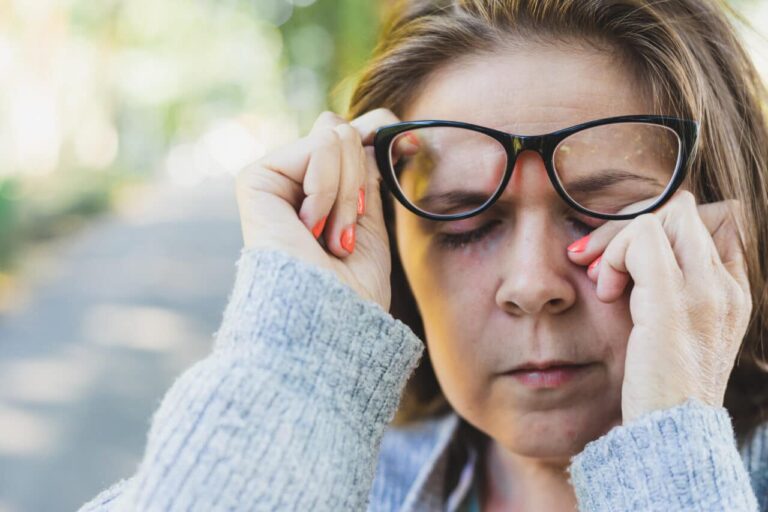While eye discomfort caused by allergies or dry eye isn’t serious, it can be uncomfortable and interfere with your daily life. Knowing exactly what is causing your symptoms can help narrow down your treatment options and get you back to feeling your best!
Eye Allergy Symptoms

Eye allergies are also referred to as allergic conjunctivitis. However, unlike other forms of conjunctivitis, it is not contagious. The most notable symptom of eye allergies is eye itchiness, which can be severe in some cases. If your eyes are irritated but not itchy, it’s probably not due to allergies.
In addition to itchiness, allergic conjunctivitis can also cause:
- Eye redness
- Watery eyes
- Burning
- Swelling of the eyelids
- Under-eye circles
- Light sensitivity
Symptoms of Dry Eye
The most common symptom of dry eye is a burning sensation caused by a lack of moisture in the eye. Other symptoms include:
- Redness
- Blurry vision
- The sensation of something caught in your eye
- Sensitivity to light
- Tired eyes
Permanent damage to the eye can happen in severe cases of dry eye, leading to vision problems.
Causes and Treatment of Eye Allergies
Eye allergies are caused by the same substances that cause regular allergies and are particularly common in people who have seasonal allergies, otherwise known as hay fever. However, in addition to pollen, year-long substances like dust mites, pet dander, mold, smoke and certain fragrances can cause eye allergies as well.
Treating eye allergies is a process that usually involves avoiding your triggers as best as possible, coupled with medication. Your doctor may prescribe treatment or recommend over-the-counter options that you can find at Herold’s Pharmacy or other local Charleston stores.
Causes and Treatment of Dry Eyes
Anyone can experience dry eye. However, according to the National Eye Institute, you may be more likely to experience dry eye if you:
- Are 50 years or older
- Are female
- Wear contact lenses
- Don’t get enough vitamin A
- Have certain autoimmune conditions, like lupus or Sjögren syndrome
Dry eye may also be brought on by excessive screen time, smoking, low humidity and being dehydrated.
Eye drops are recommended for dry eye, in addition to adjusting certain lifestyle factors (like taking frequent screen breaks.) However, it’s important not to use the same eye drops that you would for allergies as they could worsen dry eye. This is why it’s important to get an accurate diagnosis of what is causing your symptoms before trying treatment options.
For more information or to schedule an appointment with one of our expert allergists, contact Charleston ENT & Allergy today.
